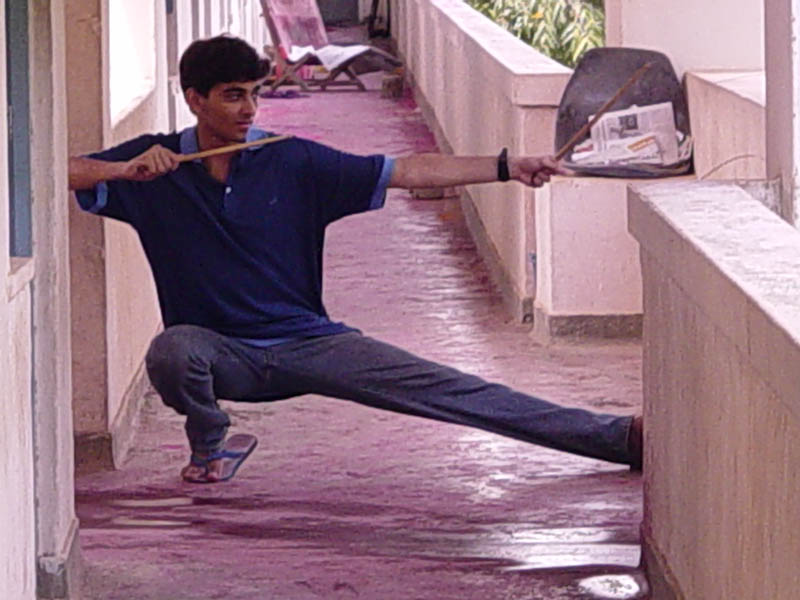Step by Step
Sunday, June 26, 2005
On Tag
Here I am, 13 days down the line, realizing that I've been tagged by Shyam. Tag - one of those unfortunate words that has inane negative associations (in this case that repellent non-character stand-in of Rachel's from Season 5(?) of Friends). Anyhow, here we are...
1. Books I own:
I generally disown more books than I care to own; so the ones I own tend to fall mainly under the category of those that I think I'll feel the need to re-read in future. Which, come to think of it, is in fact what I like to tell myself; in reality, there are scores of books I never intend to read again lying around in my house. Mostly contemporary fiction is all I can say I guess.
2 & 3. Books I recently bought and am reading now:
(Note the ingenious way in which I have used my mastery of the intricacies of the English language to condense the above two points)
In reverse chronological order of purchase:
a) The Shipping News by E. Annie Proulx.
Mostly I bought this book because I love the sound of her surname. Proulx. P-R-O-U-L-X. Prowlx. Prrooooooooool. Proox (if the L were silent) or maybe Proouhx. It would be cool if both the L and the X were silent, making it Proo, which in retrospect, sounds kinda stupid.
All this is to say nothing of the book of course. The blurb on Amazon will do a better job of that. (As you can see I am a mosht humble fellow.)
b) Humboldt's Gift by Saul Bellow.
I'd been meaning to pick up this book - Bellow's ruminations on the meaning of death - for ages and when the fella went ahead and popped it himself, it seemed an appropriate time to reach out for this Bellow.
c) Tinker, Tailor, Soldier, Spy by John le Carre.
Found this when I was looking for THe Spy Who Came in From the Cold at Blossom book store on Church Street, which with its somewhat-organized rows of second-hand books has finally made the propriety of novels an affordable and practicable idea. Le Carre took the fantasy out of the spy novel, and while I love his depth of characterization and his control of plot, I still find his style tiresome and more than repetitive.
d) A Brief History of Nearly Everything by Bill Bryson.
Awesome book. Jesht blady AWESOME! Rekindles it the interest of mine in science.
e) India After Independence by Bipin Chandra, Aditya and Mridula Mukherjea.
THis one is the second part of the trio's massive effort at tracing the history of the nation since the happenings of 1857. The first part was the prescribed text for Dilip (Prof. Veerraghavan)'s elective on the Indian Freedom Movement. More readable than the std-issue History textbooks of school, the book is excellent in putting the development of India in perspective.
4. My Favorites:
I won't attempt to name them all, but here's the partial list:
a) All About H. Hatterr by G.V. Desani.
This is, sadly, the forgotten, Lost masterpiece of Indian fiction in English. So forgotten in fact, that the book has been out of print for lenghty periods when works of much lesser radiance have found their way onto the shelves of the Crosswords and the Landmarks. It has long been argued that Salman Rushdie's gumbo-jumbo-East-West-fusion-vaunted use of language is inspired by Desani's work. This of course is a fact comfortably ignored by the commercially sharp Rushdie who, save for a solitary acknowledgement of Desani's influence on his style made sometime in the late 1990s, has preferred to ignore comparisons between the two authors at all other times. Which has all worked out quite brilliantly for him, considering that Desani, who wrote his book in 1953, and then went on to renounce material life to learn and train for seven years in a specialized form of yoga and went on to become Professor of Philosophy at the University of Texas at Austin in the 1970s, never had the chance to press his claim. Desani and Rushdie are miles apart in terms of themes covered and Desani is the purer given the fact that the theme of the work - a farcical satire on the tradition of spirituality in India - bends, melds and generally accepts the verbal ingenuity of their style in a much more graceful manner than Rushdie's gimmicky treatment of vaster themes. All About H. Hatterr is undoubtedly the smartest, most enjoyable book I've ever read.
b) The Works of Lewis Carroll.
It's difficult to point out a favourite amongst these but Phantasmagoria, his hilarious poem on the world of sprites and other-worldly affairs is the one I find most enjoyable to read.
Quickly, before I die of exhaustion, The Sun Also Rises by Ernest Hemingway, The english Patient by Michael Ondaatje, Free Fall by William Golding, Oscar and Lucinda by Peter Carey, The Harry Potter series and of course Calvin. And Hobbes too.
Saturday, June 04, 2005
On the Danger of Idle Thought
From endless midnight meanders
To staid, social, prim handshake
Is the distance of a month.
Thereabouts anyway.
From the edges, corners
Of concernless presumption,
To thingsIshouldhavedone-damn-it-damndamnwhenIhadthechance thoughts
Is the river between us.
It's been a while.
Standardized days,
Rank. And some file.
From endless midnight meanders
To staid, social, prim handshake
Is the distance of a month.
Thereabouts anyway.
From the edges, corners
Of concernless presumption,
To thingsIshouldhavedone-damn-it-damndamnwhenIhadthechance thoughts
Is the river between us.
It's been a while.
Standardized days,
Rank. And some file.

